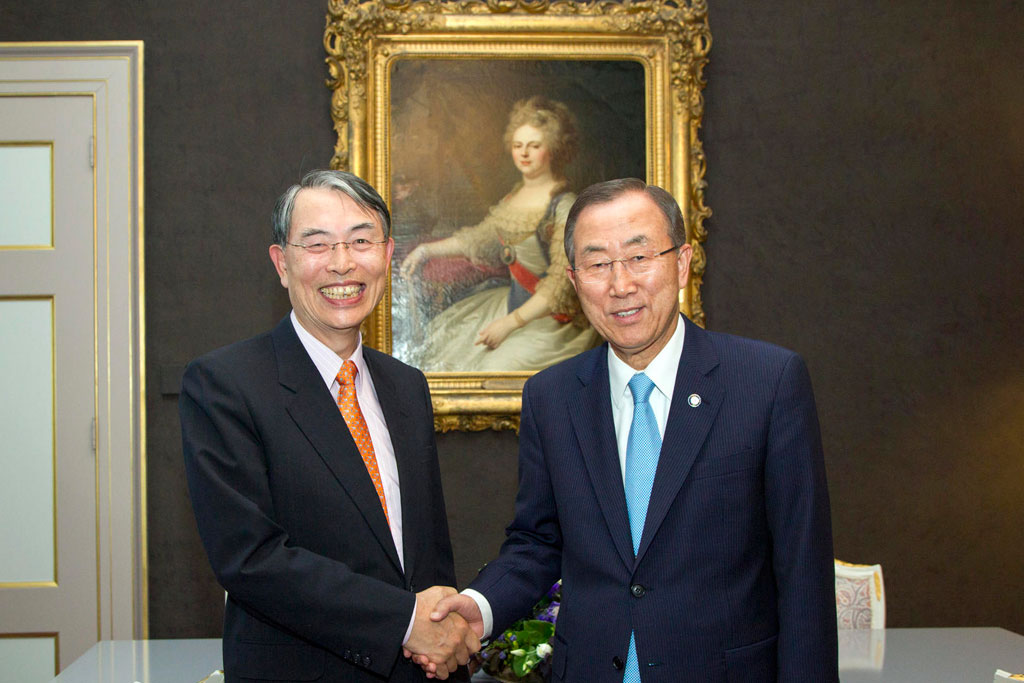Marking the tenth anniversary of the adoption of the Relationship Agreement, between the UN and The International Criminal Court [ICC] by both the General Assembly and the Assembly of States Parties [ASP], the Permanent Mission of Italy to the United Nations hosted a commemoration session and panel discussion was held today at the UN Headquarters in New York
Secretary-General, Ban Ki-Moon, opened the floor emphasizing the two milestones that were being marked: The International Criminal Justice Day and the celebration of the ten-year relationship between the United Nations, and the International Criminal Court.
“This is a day for all of us to underscore a crucial point: justice matters. So let me begin by once again calling for universal ratification of the Rome Statute,” Ban said. “The objectives of the Court and the United Nations are clearly aligned. The world’s commitment to the success of this Court is reflected in the fact that that the Relationship Agreement was approved by the General Assembly without opposition,” Ban added.
Lead speaker of the event Ambassador Sebastiano Cardi remarked that the day is meant to highlight the pressing issues relating to international justice that are behind the very establishment of the Court and the adoption of the Rome Statute.
“The strong connection between the UN and the ICC, to which Italy will continue to show its support and commitment, is highlighted by the history of the two institutions and by the profoundly shared values. Therefore this is an occasion to renew our commitment against mass atrocities,” Cardi said.
July 17th was specifically chosen and named the Day of International Criminal Justice because it signifies the adoption of the Rome Statute at a diplomatic conference in Rome on that same date in 1998, when a conference of 160 States established the first permanent international criminal court. The treaty adopted during that conference is known as the Rome Statute. Though this agreement was not signed or ratified by many important countries (China and Russia were not in Rome, US was but Congress never ratified) and was not put into force until July 1st 2002, it still represented a major stride for international justice.
The idea of creating The ICC was the beginning of a Post-WWII promise, as well as a global fulfillment of agreed-upon steps toward to put an end to impunity for perpetrators of the most serious crimes of international concern [such as genocide, crimes of war and aggression and crimes against humanity]. Its international judiciary body has the capability of bringing perpetrators to justice and providing redress to victims when states are unable or unwilling to do so.
Since regular trial processes are never enough to address the consequences of gross human rights violations the treaty was the basis of a solid foundation for mutual cooperation. It maintains the shared belief that the cause of peace can only be served if those responsible for the most serious crimes of international concern are prosecuted and brought to justice, because victims of such grotesque criminal acts need and deserve more.
Reparations were then deemed to be a necessity in assisting victims to overcome the damage they have suffered and different processes of reparations were formed. These include compensation, medical and psychological assistance, as well as symbolic reparations.
Sitting on the panel was the president of the ICC, Sang-Hyun Song, who injected the fact that a trust fund for victims work closely with different UN organizations to provide assistance to them. “The ICC does not have to create stand-alone operations due to its strong relationship with the UN,” Song said. In encouraging other States to join in and complete the ratification, he added that “Cooperation and coordination are not an option. They are a requirement.”
Also present was Tiina Intelmann, president of the ASP and also an Estonian diplomat. As she took the floor, she made sure to emphasize that the needs are as pressing today as they were in 1988. The court was established as permanent therefore much hard work has to be done to support it, she said.
“This can be done through UN decision-making by way of the General Assembly or Security Council. And we need community support on a national level as these issues are come very complex ones. We have to take a deeper look.”
Last on the panel was Miguel de Serpa Soares, the UN Under-Secretary-General for Legal Affairs made comments supported the strengthening relationship between the UN and The ICC, saying “We can defend this legacy. We stand firm and raise the flag in support of this. Impunity is no longer the order of the day.”
De Serpa Soares added that in its short lifetime, The ICC has persecuted many perpetrators for their monstrous acts and has formed a discourse between international leaders.
It seems there is far much more to be learned by just putting a lid on the past and assume that nothing had happened. And there are many lessons learned regarding policies needed to be implemented in the future order to prevent these violations. To assure that there is no recurrence a strong signal must be sent out, letting it be known that perpetrators will be held to account.
At a past commemorative event, The United Nations High Commissioner for Human Rights, Ambassador Navi Pillay, quoted Nelson Mandela in saying, “Things always seem impossible until you do them.”
“Making the impossible possible is what international criminal justice is about," pointing to many challenges that may seem impossible to resolve today, Pillay added.
Ambassador Cardi closed the session by saying that since 2011 Italian Ministers Foreign Affairs have each sent messages to the UN on this date – including current MFA Federica Mogherini – and that the flag of the Court has been flown at the Rome office of Foreign Affairs.
This year the flag also flies at the Permanent Mission at the United Nations.












